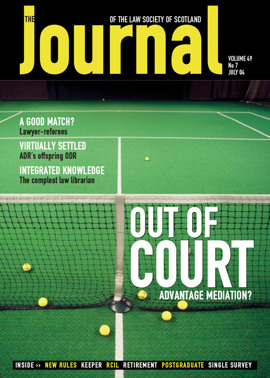Power to the people?
In contrast to the statutory right of appeal conferred on an applicant, there is no such right available to those objecting to or seeking to influence a planning application. Those parties are often referred to as “third parties”. The only mechanism available to third parties to challenge a decision to grant planning permission, is by way of judicial review in the Court of Session on a point of law. The court cannot consider the merits of the decision and its power is limited to upholding the permission or setting it aside and remitting back to the original decision-maker for a new decision to be taken. For many this represents an inherent unfairness in the planning system, which could be addressed by extending rights of appeal to third parties. The appetite for third party rights has in part been fuelled by the additional rights conferred on individuals against acts by state bodies under the incorporation into domestic law of the ECHR and the ongoing implementation of Access to Environmental Justice under the Århus Convention.
Third party appeal rights have already been considered and discarded as part of the Planning and Compensation Bill in England and Wales. But, despite the Planning Bill falling from the legislative agenda, the Executive has continued to consult on the possible content of a Planning Bill. A consultation paper “Rights of Appeal in Planning” has a closing date for responses of 30 July. Curiously, the paper does not appear in the main consultation section of the Executive website but can be accessed at www.scotland.gov.uk/ consultations/planning/roap-01.asp. No commitment has been given by the Executive that third party rights of appeal will be conferred.
The planning system plays a pivotal role in relation to economic and social progress. The people who are most affected by environmental problems often have least access to the system at large. Planning involves choices with consequences for individuals and the environment, and dialogue plus negotiation between public and private bodies. This requires confidence in a system which affects the public interest in the long term. The Executive is therefore attempting to re-engage an alienated audience – that could change the dynamic between developers, local authorities and objectors.
The consultation paper does not attempt to limit the parties who could appeal. Third parties are generally thought of as persons with an interest in the land, objectors and representatives such as community groups or environmental organisations. However a third party may include any organisation – commercial interests and public bodies such as Scottish Natural Heritage. The possibility for abuse of process by interested parties is very apparent. Public bodies may also come under public lobbying and pressure to exercise their right of appeal.
The introduction of such an appeal right would also have a considerable bearing upon the role of the legal profession as expert property law advisers. Lawyers would have to be aware and knowledgeable of the impact a third party right of appeal would have. The issue of a “satisfactory” planning permission is often the key trigger for the settlement of property transactions. Lawyers would have to take these new rights into account in drafting agreements to ensure that the intended purchaser of land is properly protected. If such a right is introduced, it may well combine negatively with the current unsatisfactory position as regards the exercise of judicial review where no statutory time limit exists within which rights should be exercised.
The Executive has suggested that an appeal should be limited to certain criteria such as “significant departures from development plans”. But this in itself would lead to an influx of court cases debating which approvals were “significant”. The goals of greater public participation and accountability in the planning system and at the same time streamlining it into a more efficient framework appear to be somewhat contradictory. The consequence of the introduction of a third party right of appeal will potentially have a negative effect on economic development.
Sandra White MSP proposed the concept of a third party right of appeal to fellow MSPs as a Private Members Bill last year, but this was not supported by the Executive’s Bills Unit and so remains a proposal. The Planning Bill was once promised and now does not appear on the legislative agenda. However Margaret Curran, the Communities Minister, stated on the matter of third party rights of appeal in June 2004, that “Nothing is ruled in or out at this time.” Is there any more room for confusion, delay and uncertainty for all those engaging with the planning system? We will have to wait and see what the Executive has planned for us.
Sarah Baillie, Planning and Environment, Anderson StrathernIn this issue
- Pushing ahead with a modernising agenda
- Equality for the employed
- Break point
- The devil in the detail
- The work goes on
- Identity crisis
- The lawmen in black
- Degrees of insight
- Image and reality
- Terminal settlement
- The informed client
- Counting down
- Speaking for the firm
- Does the EU Regulation work?
- Power to the people?
- Website reviews
- Book reviews
- New build: getting the loan funds
- Keeper's Corner
- RCIL and community rights






